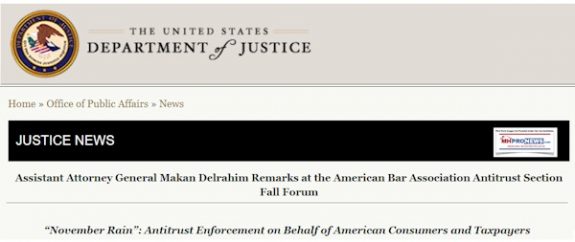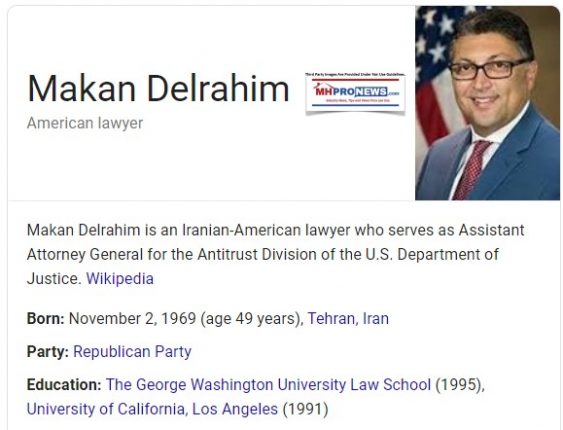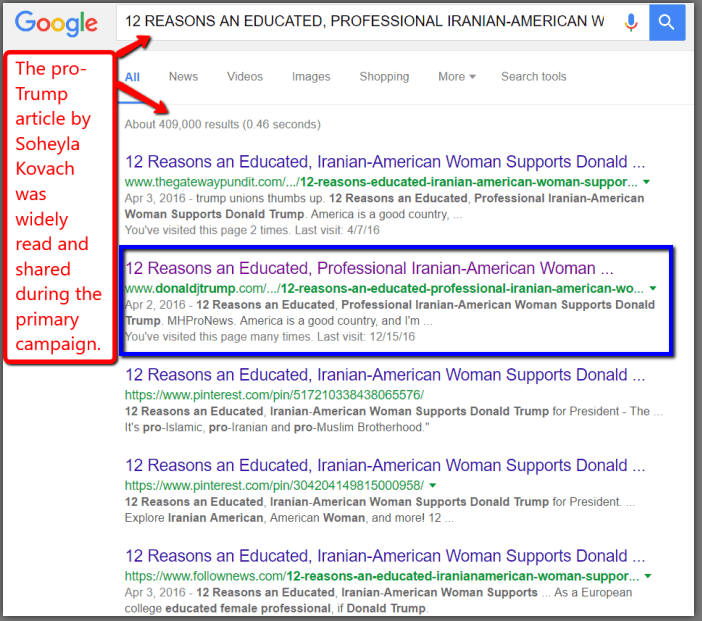
November rain is part of the title that the Department of Justice’s Assistant Attorney General Makan Delrahim gave to this talk.
As close readers of the Daily Business News on MHProNews have noted, there is a growing strain across the left-right divide that are calling for more vigorous enforcement of antitrust laws.
That’s exemplified by this factoid. On 3.13.2019, Senator Ted Cruz (TX-R) took the unusual step of praising Senator Elizabeth Warren (MA-D) on an antitrust issue. President Donald J. Trump’s 2020 campaign manager, Brad Parscale has sounded off on this concern too, as has the 45th president.
Several 2020 Democratic candidates have signed onto a letter that calls on the DOJ to take stronger steps on antitrust issues.
No one in manufactured housing trade media has devoted more time or digital ink to the study of antitrust related issues, and how that impacts the manufactured housing industry and its consumers. So, it should be common sense that this topic be included, especially now as concerns about the monopolization of America are growing seemingly by the day.
Why does this issue matter so much to manufactured housing? Because the industry is arguably being monopolized, as are others in America. For more on that, see the related reports, further below. Note that he speaks of hundreds of millions has been collected through fines on antitrust. But will even stronger moves be coming?
To better understand that, with no further adieu, let’s see what the Trump Administration’s top antitrust cop had to say.

“November Rain”: Antitrust Enforcement on Behalf of American Consumers and Taxpayers
Good morning, and thank you for the kind introduction. I’d like to thank the American Bar Association for your invitation to this year’s Fall Forum and Deb Garza for her leadership of the Section this year.
I find it hard to believe it’s been only a little more than a year since I was confirmed as AAG and spoke at last year’s Fall Forum. Over the past year, the Antitrust Division has been hard at work on behalf of American consumers. We made a number of significant enforcement actions this week, but before I turn to those, I’d like to update you on a few recent changes in the Front Office.
First, Michael Murray recently joined us from the Deputy Attorney General’s office, where he served as Associate Deputy Attorney General. Mike now will be a Deputy Assistant Attorney General in the Front Office, where he will be overseeing our Appellate Section and our 4A damage actions on behalf of the American taxpayer. Mike has significant appellate experience, including as a law clerk for Justice Anthony Kennedy.
In addition, our new acting Deputy Assistant Attorney General for Economics is Jeff Wilder. Jeff received his Ph.D. from MIT and has distinguished himself as an outstanding economist serving as one of the leaders in the Division’s Economic Analysis Group, and we’re happy to have him join us in the Front Office.
Some of you may remember that at last year’s Fall Forum, I spoke about antitrust and deregulation. In those remarks, I focused on remedies, including our preference for structural remedies and our emphasis on making consent decrees more enforceable. I also discussed our commitment to the view that antitrust enforcement is law enforcement, not industrial regulation, and that the Antitrust Division should strive to accomplish its law enforcement mission in the most efficient and effective way possible. The Division has stood by those principles.
More recently, in a speech at Georgetown, I announced several improvements to the merger review process. We are making good on those changes as well. Today, we posted a model timing agreement and a model voluntary request letter on our website. Those documents increase transparency and predictability and will help merging businesses and their counsel know what to expect as part of the merger review process. We’ve also begun tracking the duration of merger reviews more carefully, so that we can monitor our performance and factors affecting it. You will recall our goal is to resolve investigations within six months of filing, provided that the parties cooperate and comply with our document and data requests during the entire process.
I would like to focus the remainder of my remarks today on four important settlements in the last week that reflect the Antitrust Division’s commitment to vigilant and effective antitrust enforcement.
As some of you may have seen, the Division announced just yesterday a set of global settlements with three South Korean companies. Those unprecedented settlements resolve criminal charges and civil claims arising from a bid-rigging conspiracy that targeted fuel supply contracts to U.S. military bases in South Korea. They are the result of tremendous hard work in parallel criminal and civil investigations by the Antitrust Division’s Washington Criminal I Section, the Transportation, Energy, and Agriculture Section, and the Fraud Section of the Civil Division. We were assisted ably by our partners at the FBI and the Defense Criminal Investigative Service.
The United States currently maintains numerous military bases in South Korea, housing American soldiers, marines, airmen, and sailors in the region. These military bases need fuel for various purposes, and two Department of Defense agencies, the Defense Logistics Agency (DLA) and Army and Air Force Exchange Service (AAFES), contract with South Korean companies to supply fuel to the numerous U.S. military bases throughout South Korea.
Our investigation, which is ongoing, revealed that SK Energy, GS Caltex, Hanjin Transportation, along with other co-conspirators, rigged bids and fixed prices for fuel supply contracts issued by the U.S. military in South Korea for over a decade. They cheated the Military and American taxpayers out of precious limited resources. As a result of the conspiracy, the Department of Defense paid substantially more for fuel supply services. Although the immediate victim here was the U.S. military, the American taxpayer, you and me, ultimately footed the bill.
The three companies agreed yesterday to plead guilty to criminal charges under Section 1 of the Sherman Act, and they will pay at least $82 million in criminal fines for their involvement in the conspiracy. Importantly, the three defendants have also agreed to cooperate with the ongoing criminal investigation of the conduct.
Robert Jackson, who is one of my legal heroes, recognized that bid rigging is particularly harmful to government purchasers. When he served as Assistant Attorney General in charge of the Antitrust Division, Jackson broadly denounced arrangements that “compel purchasers to pay a price based on calculation, not competition,” and specifically emphasized that “[w]hatever the effect of this on private buyers, it completely destroys the mechanism set up by federal, state, and municipal governments to keep favoritism and corruption out of public buying.”
The harm Jackson recognized still exists today, and these settlements serve as an important reminder that the Justice Department and its law enforcement partners will investigate aggressively and prosecute without hesitation companies who cheat the United States government and the American taxpayer.
We did not stop there. We are committed to using all authorities Congress has granted to us to remedy antitrust injuries to the American taxpayer. Those tools include the authority conferred in Section 4A of the Clayton Act. Section 4A is an important but underused enforcement tool that allows the government to recover treble damages for antitrust violations when the government itself is the victim.
To that end, the Division established a parallel civil enforcement team, led by Kathy O’Neill and a group of capable litigators from the Transportation, Energy, and Agriculture Section to pursue parallel civil actions for damages. We negotiated separate civil resolutions with each of the three defendants on behalf of American taxpayers. We also worked alongside our partners in the Civil Division’s Fraud Section, who pursued charges against the defendants under the False Claims Act for making false statements to the government in connection with their conspiracy.
To resolve both the civil antitrust and the False Claims Act violations, these three defendants have agreed to pay an additional $154 million in total. They also have agreed to cooperate fully with the Division’s ongoing civil investigation and to implement effective antitrust compliance programs.
These historic cases mark the first significant settlements under Section 4A in many years. In fact, as far as we can tell based on our records, they are the largest settlements the government has ever recovered since the enactment of Section 4A.
Let me take a step back to review the history of Section 4A.
When Congress enacted the Sherman Act in 1890 and the Clayton Act in 1914, neither statute contained a provision specifically allowing the government to recover damages it suffered as a result of an antitrust violation. In 1939, the United States, led by Assistant Attorney General Thurman Arnold, brought its first-ever antitrust suit for damages on its own behalf. The government claimed authority to do so under Section 7 of the Sherman Act, which was the predecessor of Section 4 of the Clayton Act. As most of you know, Section 4 permits “any person” injured by an antitrust violation to recover the damages they suffered.
In that pioneering case, United States v. Cooper, the government alleged that eighteen defendants had “collusively fixed” bids that were “identical to the penny on eighty-two different sizes of tires” sold to the United States. The defendants successfully moved to dismiss the action on the question of whether the government is a “person” entitled to bring an action for damages under the statute. The Second Circuit affirmed, and the Supreme Court ultimately held that the United States is not a “person” entitled to sue.
In 1955, Congress amended the Clayton Act in response to the Court’s ruling in Cooper by adding Section 4A. As originally enacted, Section 4A allowed the government to recover only single damages, so that the government could recover damages where it was the victim of an antitrust violation.
At first, the Division used Section 4A aggressively, filing numerous cases for damages throughout the 1960s and 1970s. In the 1980s, however, the government brought only four cases under Section 4A—a remarkable decline from the prior two decades. Some attributed this drop, in part, to the Supreme Court’s Illinois Brick decision in 1978, because many of the cases brought in the ‘60s and ‘70s involved claims by the United States as an indirect purchaser. The government, however, increasingly purchases goods and services directly.
The next milestone came in 1990, when Congress amended the Clayton Act again to allow the government to seek treble damages in Section 4A cases.
Since 1990, a span of nearly thirty years, only three Section 4A cases have been filed. In 1991, the Division recovered $250,000 from two companies for rigging bids to purchase surplus gunpowder. In 1994, the Division filed suit against two defense contractors for entering into a “teaming” arrangement that eliminated competition in supplying the Department of Defense with cluster bombs. In that case, the Division recovered $4 million on behalf of American taxpayers and obtained an $8 million discount on the bid price. In 2012, the Division challenged collusion between two companies bidding on four natural gas leases at auctions run by the Bureau of Land Management. The Division recovered $275,000 from each company.
The American Taxpayer deserves to see a revitalization of the government’s Section 4A authority. This week’s settlements are only the first in that direction. Going forward, the Division will exercise 4A authority to seek compensation for taxpayers when the government has been the victim of an antitrust violation. We hope that these efforts will also deter future violations.
In light of our policy of seeking damages under Section 4A where available, I would like to address how parallel criminal and civil enforcement will proceed going forward.
First, the Division’s new focus on Section 4A enforcement will not require any changes to the Division’s leniency policy. The Division offers strong incentives to come forward to report criminal antitrust violations in exchange for leniency, and those incentives do not change when the government is harmed by the violation.
The Antitrust Criminal Penalty Enhancement and Reform Act of 2004, better known as ACPERA, created another valuable incentive for leniency applications. Under ACPERA’s detrebling provision, those who successfully qualify for leniency will be subject only to single damages in follow-on civil suits, rather than treble damages. In addition, those who successfully qualify for leniency are not subject to joint and several liability.
This detrebling incentive will apply to any Section 4A claims brought by the government. We will also follow the underlying requirements for ACPERA in Section 4A cases: companies will need to cooperate with the civil team, as they would with any private plaintiff, in order to reap the detrebling benefits.
The bottom line is that the Division’s enforcement of Section 4A will increase the incentive for co-conspirators in cartel cases to come forward.
Separately, I should note that global resolutions like the ones announced yesterday should serve the interests of the parties as well. Cooperating companies subject to penalties under multiple statutes can gain certainty and finality. Employees, customers, and investors can resolve the problem and move on. This is consistent with the Department’s broader policies on coordination of corporate penalties.
Next, as we pursue Section 4A damages going forward, global resolutions of criminal and civil antitrust liability will help maintain a consistent policy on how to calculate civil damages. Yesterday’s settlements underscore this point. They provide that SK Energy, GS Caltex, and Hanjin each will pay an amount calculated to exceed the overcharge paid by the government. At the same time, the amount reflects both the value of the cooperation commitments each defendant made as a condition of settlement and the cost savings the Division realized by avoiding extended litigation.
As a general matter, if the government is required to litigate claims it brings under Section 4A, the government will seek treble damages. In addition, we anticipate that earlier cooperators will benefit by paying a lower multiple of damages, because the value of their cooperation is higher earlier in our investigation.
I will turn now to another significant settlement the Division filed this week, one which resolves a complaint against six broadcast television companies alleging that they engaged in widespread, unlawful sharing of non-public, competitively sensitive information. Along with the complaint, the Division filed proposed final judgments requiring the companies to cease such conduct and to undergo rigorous compliance and reporting measures for the next seven years.
We uncovered this conduct during our investigation into Sinclair Broadcasting Group’s proposed acquisition of Tribune Media Company, which has since been abandoned.
As we allege in the complaint, the defendants agreed in local broadcasting markets throughout the United States to exchange revenue pacing information and other competitively sensitive information. “Pacing” compares a broadcast station’s revenues booked for a certain time period to the revenues booked in the same point in the previous year. Pacing indicates how each station is performing versus the rest of the market and provides insight into each station’s remaining spot advertising for the period.
We discovered that the defendants had been exchanging pacing information either directly between stations or corporate headquarters, or indirectly through national representatives that help local stations sell advertisements to national advertisers. By exchanging this information, the broadcasters were better able to anticipate whether their competitors were likely to raise, maintain, or lower spot advertising prices, which in turn helped inform the stations’ own pricing strategies and negotiations with advertisers. As a result, the information exchanges harmed the competitive price-setting process.
We have not heard any legitimate pro-competitive justification for this conduct. We are therefore pleased that these companies recognized that a protracted investigation and litigation would serve no purpose, and we welcome their cooperation as our investigation continues. We also want to remind businesses, as well as the antitrust practitioners that advise them, that agreements between competitors to exchange competitively sensitive information can violate the antitrust laws and lead to a civil enforcement action even if the conduct does not amount to the type of hard core cartel conduct that the Antitrust Division prosecutes criminally.
Finally, this morning we announced the third significant enforcement resolution this week—a settlement with Atrium Health, formerly known as Carolinas Healthcare System. We were joined in the settlement by the North Carolina Attorney General’s Office, and we thank them for their partnership in this action. The settlement resolves over two years of civil antitrust litigation challenging the hospital system’s use of anticompetitive steering restrictions in its contracts with major health insurers. These steering restrictions prevented health insurers from promoting innovative health plans and more cost-effective healthcare providers.
Atrium is the dominant hospital system in the Charlotte, North Carolina metropolitan area. It used its market power to limit major health insurers’ ability to introduce plans designed to encourage consumers to choose cost-effective healthcare providers. Specifically, Atrium would agree to participate in a broad network plan only if the insurer would commit not to introduce other plans that would steer patients away from Atrium. The steering restrictions also deliberately constrained insurers from providing consumers with transparency into the comparative cost and quality of their healthcare alternatives.
Because the steering restrictions were in place, insurers could not introduce more innovative health insurance plans that create financial incentives for patients to use lower-cost healthcare services. Needless to say, competition for patients encourages healthcare providers to reduce costs, lower prices, and increase quality. These steering restrictions inhibited competition among healthcare providers to provide higher quality, lower-cost services.
The resolution prevents Atrium from enforcing the steering restrictions in its contracts with major health insurers. If approved by the Court, it will restore competition between healthcare providers in Charlotte, North Carolina.
I would like to make a broader point about the Division’s settlements this week. The consent decrees in all three cases, like all other decrees the Division has entered into the past 13 months, include specific new provisions designed to improve their enforceability.
These provisions (i) address the burden of proof in a civil contempt action by providing that the preponderance standard will apply; (ii) make defendants responsible for reimbursing the government for all costs it incurs in connection with enforcing the decree; (iii) allow the United States to seek a one-time extension of the term of the decree in the event of a violation, or to terminate the decree early if continuation is no longer necessary or in the public interest. Another provision addresses interpretation of the decree by stating that courts can enforce any provisions that are stated specifically and in reasonable detail, whether or not they are clear and unambiguous on their face.
The Division serves as a guardian of American consumers, and we act in the public’s trust. When the Division enters into a consent decree to resolve charges of anticompetitive conduct, we will hold parties’ feet to the fire and enforce the decrees.
Finally, last Friday, three defendants pled guilty to conspiring to rig bids and allocate the market in auctions of foreclosed properties in Palm Beach County, Florida. This case is unlike the Division’s prior foreclosure auction prosecutions because the auction occurred online rather than in-person, and the collusion occurred primarily by text message rather than in-person. It is a good illustration of the fact that while defendants may use new platforms and technologies to commit antitrust crimes, the Division too is evolving and stands ready to prosecute these crimes in the digital age.
The conspiracy took place in the aftermath of the financial crisis, which affected the housing market nationwide and the Florida real estate market in particular. Defendants and their affiliated business entities were the largest buyers of foreclosed properties in Palm Beach County. Together, the commerce affected by the defendants’ collusion was $25 million.
The Division began an investigation into possible collusion in online foreclosure auctions in Palm Beach County, Florida after receiving an anonymous citizen complaint that included a link to a YouTube video detailing the collusion.
Co-conspirators texted each other to coordinate their bidding and facilitate the conspiracy to obtain foreclosed homes at suppressed prices. Most commonly, bidders would agree to stop bidding or to refrain from bidding at their co-conspirators’ request. In some instances, they lowered bids for each other’s benefit.
After learning of the investigation, one of the defendants used and encouraged other co-conspirators to use a text messaging application to continue colluding. He believed that law enforcement would be unable to read or trace any messages sent through the application.
The three defendants were indicted by a grand jury in November 2017. Since then, all three have pleaded guilty.
I will conclude by taking this opportunity to highlight the outstanding attorneys and economists at the Antitrust Division. They are the core of executing the Division’s mission and work tirelessly in their commitment to protect competition and consumers.
It has been a busy year at the Antitrust Division. We have been working hard on behalf of America’s consumers and taxpayers, and look forward to continuing our efforts on their behalf in the year to come.
Thank you. ##
Remarks as prepared, per the Department of Justice (DoJ). Talk given in Washington, DC on Thursday, November 15, 2018. Last updated, November 19, 2018.

See the related reports – after the bylines, notices and email headline news signup – for reasons why this is already a serious issue for manufactured housing, and could be a major topic for the 2020 campaign on both sides of the left-right political aisle.
As an added disclosure, the author is born in the same city and nation as Mr. Delrahim.

“You Made Me, Promises, Promises…” Historic Iranian, American Lessons in Freedom
That’s this morning’s “News through the lens of manufactured homes, and factory-built housing” © where “We Provide, You Decide” © ## (News, analysis, commentary.)

NOTICE: You can get our ‘read-hot’ industry-leading emailed headline news updates, at this link here. You can join the scores who follow us on Twitter at this link. Connect on LinkedIn here.
NOTICE 2: Readers have periodically reported that they are getting a better experience when reading MHProNews on the Microsoft Edge, or Apple Safari browser than with Google’s Chrome browser. Chrome reportedly manipulates the content of a page more than the other two browsers do.
(Related Reports are further below. Third-party images and content are provided under fair use guidelines.)
1) To sign up in seconds for our MH Industry leading emailed news updates, click here.

2) To pro-vide a News Tips and/or Commentary, click the link to the left. Please note if comments are on-or-off the record, thank you.
3) Marketing, Web, Video, Consulting, Recruiting and Training Re-sources

Related Reports:
You can click on the image/text boxes to learn more about that topic.
Bridging Gap$, Affordable Housing Solution Yields Higher Pay, More Wealth, But Corrupt, Rigged Billionaire’s Moat is Barrier – manufacturedhomelivingnews.com
America woke up today to division. But perhaps 75 percent (+/-) of the nation’s people could come together on a plan that demonstrably could do the following. Increase the U.S. Gross Domestic Product (GDP) by some $2 Trillion Annually, without new federal spending.
https://manufacturedhomepronews.com/masthead/conquest-capitalism-thoughts-of-chairman-warren-buffett-billionaires-campaign-to-control-trillion-dollar-affordable-housing-market/
https://manufacturedhomepronews.com/masthead/warren-buffetts-moat-understanding-manufactured-housing-requires-grasping-strategic-economic-moats/
https://manufacturedhomepronews.com/masthead/conquest-capitalism-thoughts-of-chairman-warren-buffett-billionaires-campaign-to-control-trillion-dollar-affordable-housing-market/
https://manufacturedhomepronews.com/masthead/manufactured-housing-institutes-three-stooges-seco-leaders-george-f-allen-spencer-roane-tom-lackey-and-rent-to-own-scams/
https://manufacturedhomepronews.com/masthead/radically-aspirational-black-history-affordable-housing-social-justice-and-manufactured-homes/

























